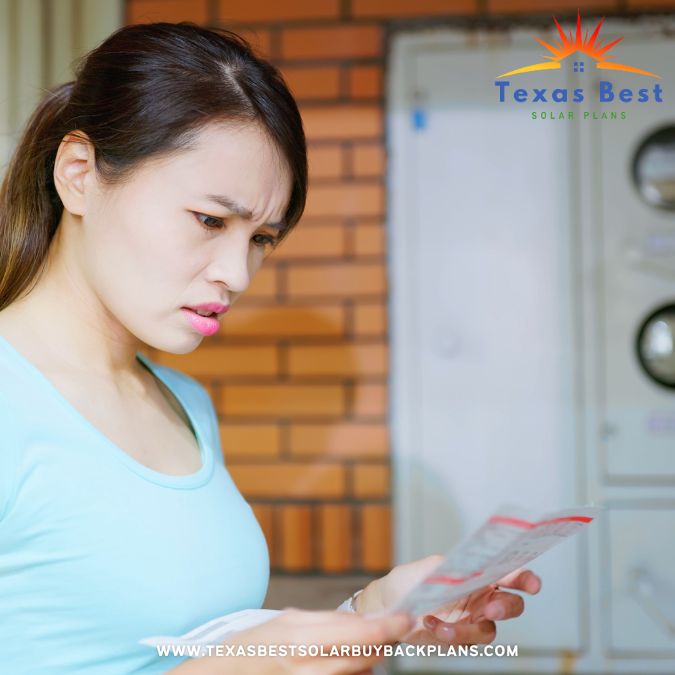
Understanding Texas Electricity Bills: Don’t Get Roped Into Hidden Fees!
Electricity bills in Texas can feel like a mystery, with fluctuating costs and hidden fees. But at Texas Best Solar Buy Back Plans, we’ve got your back! With over 20 years of experience in the Texas electricity market, we’re here to help you cut through the confusion, maximize savings, and avoid any surprises. Call us today or use our plan finder to get started on saving big!
Ever wondered why your Texas electricity bill can jump from $105 one month to $260 the next? You're not alone! Understanding how electricity bills work in Texas can be a bit like herding cattle—lots of moving parts, and if you’re not careful, something’s bound to get away from you. Let’s take a closer look at what’s really driving your electricity costs and how you can wrangle that bill back down to size.
The Average Household in the U.S. Spends $1,296 on Electricity Each Year
Electricity is a big part of every Texan’s budget. In fact, the average U.S. household forks out nearly $1,296 annually just to keep the lights on. Businesses? Even more! Small businesses spend an average of $7,807 a year on electricity. Whether you’re powering up the fridge or keeping the A/C blasting in the Texas heat, energy costs can add up fast.
But what exactly makes up that bill, and how can you manage it?
Understanding Your Texas Electricity Bill
When you get your monthly electricity bill, you’re essentially paying for two things: Supply and Delivery. One charge goes to your electricity supplier (that’s for the energy you use), and the other goes to your local utility company (that’s for delivering the electricity to your home).
Think of it like ordering some mouth-watering Texas BBQ. You’ve got the cost of the food itself (the supply) and the delivery fee to get it to your front door (delivery charges). Both are essential but separate pieces of the puzzle.
Here’s a breakdown of how these two charges show up on your bill:
- Supply Services: The actual cost of electricity you use.
- Delivery Services: The utility’s charge for maintaining the grid and delivering electricity to your home.
Common Terms on Your Electricity Bill
Your electricity bill is likely full of jargon that makes as much sense as a rattlesnake in a rodeo. But don’t fret, we’ve got the lowdown on the most common terms you’ll encounter:
| Term | What It Means |
|---|---|
| Meter Multiplier | If your energy use exceeds what your meter can display, a multiplier is applied to reflect your actual usage. |
| Customer Charge | An administrative fee your electricity provider charges to cover their customer service and billing costs. |
| Distribution Charge | Charges for the use of local transformers, wires, and substations that deliver electricity to your home. |
| Purchased Electricity Adjustment | When the supplier charges you differently than what they paid, this adjustment balances things out. |
| Franchise Cost | The fee your utility pays to your city or municipality to operate within their space, passed on to you. |
Who’s Really Pocketing Your Money?
The total cost of your electricity bill depends on several factors: where you live, your provider, and how much electricity you’re using. But here’s the kicker—about half of your bill goes to the utility company for delivery charges, and the rest goes to the electricity supplier.
In Texas, you’ve got the power to choose your electricity supplier, which means you can shop around for the best deal. But, be aware that utility delivery fees are set by the state and will stay the same no matter which supplier you choose.
Getting the Best Rate for Your Home or Business
Navigating the Texas electricity market can be as tricky as figuring out who makes the best chili in town. But here’s a pro tip: just like when you’re picking a new truck or insurance plan, you’ve got to shop around to get the best deal. Here’s how to make sure you’re getting the best bang for your buck:
- Shop Around: The first step is finding a supplier that offers competitive rates. PowerMax Energy or Texas Best Solar Buy Back Plans is a great resource to compare rates as we've done all the hard work for you.
- Look for Incentives: Many providers offer special rebates or incentives. Keep an eye out for solar buyback plans or discounts for using energy during off-peak hours.
- Avoid Hidden Fees: Some plans look cheap at first glance but come with hidden fees like meter charges or early termination fees. Always read the fine print.
Chart: Average Texas Electricity Costs by Plan Type
| Plan Type | Average Cost (per kWh) | Details |
|---|---|---|
| Fixed Rate Plan | 10.5¢ | Your rate stays the same throughout the contract period. |
| Variable Rate Plan | 11.8¢ | Rate can fluctuate based on market conditions. |
| Indexed Rate Plan | 9.8¢ | Tied to wholesale energy prices, which can lead to savings but is riskier during high demand seasons. |
| Solar Buyback Plan | 8.2¢ – 12.5¢ | Earn credits for the excess energy your solar panels send back to the grid, rates depend on the provider. |
Let Us Help You Get the Best Deal!
At Texas Best Solar Buy Back Plans, we’ve been in the electricity market since 2003, and we’ve learned a thing or two about helping Texans save money. Whether you’re looking to make the most of your solar panels or just trying to lower your electricity bill, we’ve got the know-how to help you out.
Ready to make your electricity bill work for you? Call us today or use our Plan Finder and let’s get started on cutting down those costs!
Resources:
Got more questions? Feel free to reach out to our team or drop a comment below!

